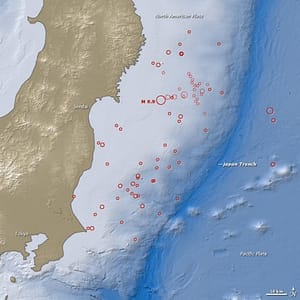 The recent 8.9 magnitude earthquake in Japan will not only leave an everlasting impression on the country, but globally as a result of the quake’s effect on the rotation of the Earth and GPS coordinates, according to Richard Gross, a geophysicist at NASA’s Jet Propulsion Laboratory. The intense earthquake that struck Japan on March 11, 2011, has accelerated Earth’s spin – which has has shortened the length of Earth’s day by a fraction and shifted how the planet’s mass is distributed.
The recent 8.9 magnitude earthquake in Japan will not only leave an everlasting impression on the country, but globally as a result of the quake’s effect on the rotation of the Earth and GPS coordinates, according to Richard Gross, a geophysicist at NASA’s Jet Propulsion Laboratory. The intense earthquake that struck Japan on March 11, 2011, has accelerated Earth’s spin – which has has shortened the length of Earth’s day by a fraction and shifted how the planet’s mass is distributed.
The earthquake shortened of the length of the 24-hour day by 1.8 microseconds. Aftershocks in Japan could continue to result in further changes to GPS coordinates, the length of day, and the shifting of the Earth’s axis.
How could an earthquake speed up the Earth’s rotation? It turns out the answer is related to the distribution of mass. Since there was a change in the distribution of mass related to the Japanese quake, the rotation of the Earth sped up. This distribution in mass also influences the Earth’s axis which experienced a 6.5-inch shift as a result.
While such a small change won’t cause people to change their clocks, the dramatic shift in geography will require updates to GPS devices and maps which rely on GPS coordinates. Japan has a network of 1,200 GPS monitoring stations across the country. These stations detected a maximum displacement of 13 feet with an average displacement of 8 feet recorded over a 300 mile area. Elevation in some areas has also changed including the coastline resulting in water depth changes of about 3 feet. As a result, GPS tracking coordinates on maps, driving directions, property records and nautical charts are just some of the items which will need to be updated.